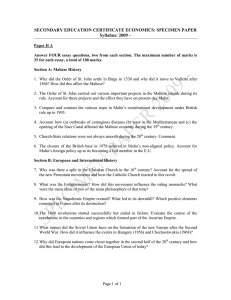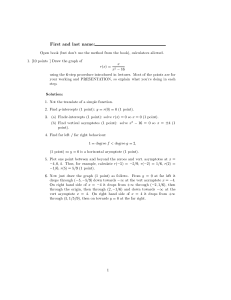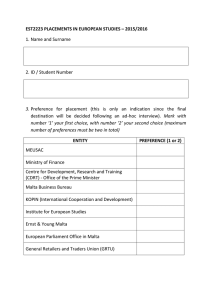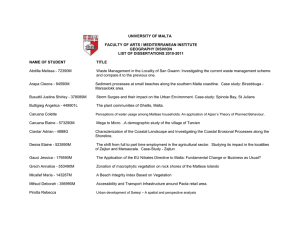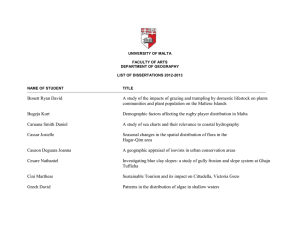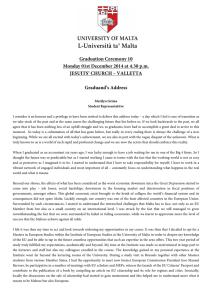FHS Monthly Newsletter: June 2013
advertisement
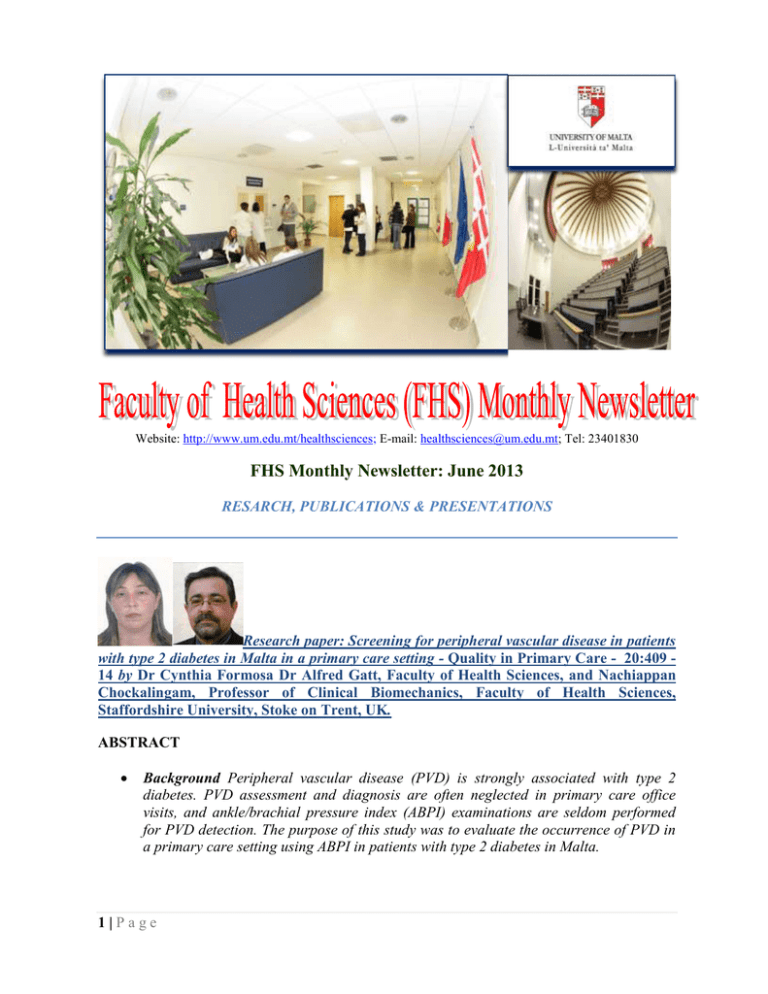
Website: http://www.um.edu.mt/healthsciences; E-mail: healthsciences@um.edu.mt; Tel: 23401830 FHS Monthly Newsletter: June 2013 RESARCH, PUBLICATIONS & PRESENTATIONS Research paper: Screening for peripheral vascular disease in patients with type 2 diabetes in Malta in a primary care setting - Quality in Primary Care - 20:409 14 by Dr Cynthia Formosa Dr Alfred Gatt, Faculty of Health Sciences, and Nachiappan Chockalingam, Professor of Clinical Biomechanics, Faculty of Health Sciences, Staffordshire University, Stoke on Trent, UK. ABSTRACT Background Peripheral vascular disease (PVD) is strongly associated with type 2 diabetes. PVD assessment and diagnosis are often neglected in primary care office visits, and ankle/brachial pressure index (ABPI) examinations are seldom performed for PVD detection. The purpose of this study was to evaluate the occurrence of PVD in a primary care setting using ABPI in patients with type 2 diabetes in Malta. 1|Page Method A retrospective study was conducted on a cohort of 243 patients with type 2 diabetes to address various issues. As part of this large study, data from ABPI measurements collected using a portable hand-held Doppler with ankle pressures of <0.8 suggestive of PVD were extracted. Results Twenty-six per cent of the sample had to be referred for further vascular assessment following this screening programme due to their critical vascular status. Furthermore, at the time of examination, approximately 7% of the patients had an ABPI of less than 0.8 in both left and right extremities. Conclusion A significant proportion of Maltese patients with type 2 diabetes who visit primary care present with vascular insufficiency. The use of ABPI should be considered as an added measurement in order to facilitate early detection and treatment and reduce the burden of PVD in this high-risk population. Senior management leadership, social support, job design and stressor-to-strain relationships in hospital practice by Sandra Buttigieg, Department of Health Services Management and Michael A. West, Lancaster University Management School, Lancaster University, Lancaster, UK in the Journal of Health Organisation and Management, Vol. 27 No 2, 2013 pages 171-192. Abstract Purpose – The purpose of this paper is to examine the effect of the quality of senior management leadership on social support and job design, whose main effects on strains, and moderating effects on work stressors-to-strains relationships were assessed. Design/methodology/approach – A survey involving distribution of questionnaires was carried out on a random sample of health care employees in acute hospital practice in the UK. The sample comprised 65,142 respondents. The work stressors tested were quantitative overload and hostile environment, whereas strains were measured through job satisfaction and turnover intentions. Structural equation modelling and moderated regression analyses were used in the analysis. Findings – Quality of senior management leadership explained 75 per cent and 94 per cent of the variance of social support and job design respectively, whereas work stressors explained 51 per cent of the variance of strains. Social support and job design predicted job satisfaction and turnover intentions, as well as moderated significantly the relationships between quantitative workload/hostility and job satisfaction/turnover intentions. Research limitations/implications – The findings are useful to management and to health employees working in acute/specialist hospitals. Further research could be done in other counties to take into account cultural differences and variations in health 2|Page systems. The limitations included self-reported data and percept-percept bias due to same source data collection. Practical implications – The quality of senior management leaders in hospitals has an impact on the social environment, the support given to health employees, their job design, as well as work stressors and strains perceived. Originality/value – The study argues in favour of effective senior management leadership of hospitals, as well as ensuring adequate support structures and job design. The findings may be useful to health policy makers and human resources managers. Psychometric Properties of the Persian Spiritual Coping Strategies Scale in Haemodialysis patients, Journal of Religion and Health 52(1) March 2013 (on line), Saffari M., Koenig H.G., Pakpour A.H., Baldacchino D.R. Abstract: Spiritual strategies may provide an effective way of coping with disease. This study sought to investigate the validity and reliability of the Persian version of the spiritual coping strategies (SCS) scale among Iranian hemodialysis patients. A convenience sample of 204 hemodialysis patients was recruited to participate in the study. A forward–backward translation method was used to produce the Persian version of the scale. Internal consistency was assessed by Cronbach’s alpha and item–total score correlation. Two-week test– retest reliability was also assessed. The convergent and divergent validity of the scale was evaluated using the Duke University Religion Index and a visual analogue scale for health status. Exploratory and confirmatory factor analyses were used to assess the factor structure. Participants consisted of 113 males and 91 females (mean age 57.2 [SD = 9.7]). Cronbach’s alpha was acceptable (0.87). We found two underlying factors similar to the original scale. The correlations between the study scales confirmed the convergent and divergent validity of the SCS. Confirmatory factor analysis showed a good fit to the data (GFI = 0.923, CFI = 0.948 and RMSEA = 0.068). The Persian version of the SCS has sound psychometric properties in Iranian hemodialysis patients. Future research should consider applying the scale to population with other religious/cultural backgrounds. Note: Additional to the above Persian translation in Tehran, Dania Scale has also been translated into the Spanish and Italian languages and tested psychometrically and published: Hawthorne, D., Youngblut,J.M., Brooten, D. (2011). Psychometric Evaluation of the Spanish and English Versions of the Spiritual Coping Strategies Scale. Journal of Nursing Measurement 19 (1), 46-54. Burrai F., Scalorbi S., Sebastiani S., Cenerelli D., Cocchi E. (2009). Esplorazione fattoriale con analisi delle component principali del questionario Spiritual Coping 3|Page Strategies. (Psychometric analysis of the principal components of the Spiritual Coping Strategies). Scenario 26 (3) 13-20. Anthony Scerri, Charles Scerri. Dementia in Malta: New prevalence estimates and projected trends Malta Medical Journal (2012) 24 (03); 21-24. Available online: http://www.um.edu.mt/umms/mmj/PDF/362.pdf ABSTRACT: Previous estimates have indicated that in 2005, there were 4,072 individuals with dementia (IWD) in the Maltese islands and that this number would almost double by the year 2050. These figures were based on the EURODEM project that analysed the results of a population-based systematic review of published studies on the global prevalence of dementia from 1980 to 2004. Since then, further dementia prevalence studies have been carried out in Europe. These were reviewed in another European funded project, the EUROCODE project, with the aim of developing consensual European age and gender specific prevalence rates that would be acceptable for all countries. Using these revised rates, the estimated number of IWD over 60 years of age in the Maltese islands in 2010 was found to be 5,198; a significant increase on previous projected data. Likewise, the number of IWD in Malta over 60 years in 2030 is projected to be close to 10,000 persons or 2.3% of the total Maltese population. Using these revised estimates, the 2% prevalence rate of dementia among the local population is expected to be reached by 2025; twenty-five years prior to what was previously reported. The data presented here include current updated estimates and projections for the number of IWD in the Maltese islands. Mr Martin Ward, Mental Health Nursing In April Mr Martin Ward gave a keynote presentation entitled "Psychodermatology: the significance of appropriate diagnosis" at the international skin care conference at the Excelsior Hotel, Malta, organised by the Malta Association of Skin and Wound Care (MASC), attended by 350 multi-disciplinary delegates. Psychodermatological conditions fall into three distinct categories: co-morbid conditions which occur in relation to psychiatric problems and require treatment for the skin condition, primary psychiatric problems with associated skin problems which primarily require treatment of the psychiatric problem and secondary psychiatric problems which require treatment to both the psychiatric problem and the skin condition. Incorrect diagnosis may lead to harmful and wasted treatment and may even result in suicide by patients desperate to escape the failure to resolve the devastation caused by co-morbid conditions. 4|Page In May Martin Ward gave a keynote presentation entitled "Ownership: the key to effective care" at the annual Infection Control conference at the Dolman Hotel organised by the Infection Control Department, Malta. The talk addressed the issue of staff understanding the nature of standards and procedures for effective practice and taking responsibility for implementing these in their practice. Accountability for these focused on the individual owning their own skills and knowledge and not relying on the actions of others to determine the nature of their clinical practice. PAST EVENTS Research Seminars 2012/2013 Virtual Environment Radiotherapy Training (VERT) On the 8th May, 2013, Dr Paul Bezzina and his team gave a very interesting presentation on the Virtual Environmental Radiotherapy Training (VERT) at the Radiography Department seminar lecture rooms. The aim of this presentation was to provide an overview of the radiography course and the use of a virtual environment for teaching purposes for students, staff, patients and the general public. 5|Page Virtual Environment Radiotherapy Training (VERT) TRAINING ISSUES THAT VERT ADDRESSES: o Increases clinical facilities for training o There are no radiotherapy machines dedicated for staff training as they are expensive o Difficult to allow time for training on hospital based radiotherapy units o Allows review of advancing, existing and developing techniques before clinical implementation o Practical training in cross-sectional anatomy and integration of imaging WHAT IS VERT? o VERT is a virtual environment of a radiotherapy treatment room o VERT has been specifically designed as a learning and skills training tool o VERT enhances the understanding of radiotherapy concepts that are often difficult to teach in a classroom setting o VERT enables hands on experience of patient set up with the virtual LINAC controlled using an actual hand pendant and one can walk around the virtual treatment room o VERT can upload any radiotherapy treatment plan allowing a vast range of simple to complex treatment plans to be evaluated for training o VERT loads and simulates treatment plans created by trainees so they can gain experience otherwise only available in the clinical setting ADVANTAGES OF USING VERT o Is a cost effective training alternative to training in clinical environments o Provides students with a safe, non-pressured learning environment o Provides students with unlimited practice without risking harm to patients o Clinical treatment rooms become more efficient as training demands are reduced o Visualisation of treatment plans, anatomy, dose distributions o Provides training on both Varian and Electa LINACs We would like to thank Paul and his team for their contribution. 6|Page ANNOUNCEMENT Fellows of the Faculty of Podiatric Medicine of the Royal College of Physicians and Surgeons of Glasgow Dr Cynthia Formosa, Dr Alfred Gatt and Mr Stephen Mizzi have been made fellow of the Faculty of Podiatric Medicine of the Royal College of Physicians and Surgeons of Glasgow. They graduated on the 29 May 2013 and the ceremony took place in the Bute Hall at the University of Glasgow. Established on 11 May 2012, the Faculty of Podiatric Medicine within the Royal College of Physicians and Surgeons, Glasgow is the first such faculty within a UK medical Royal College. Its creation recognises there is an opportunity to further enhance podiatric care in the United Kingdom and internationally. We congratulate Cynthia, Alfred and Stephen for their achievement. Press Release – Department of Food Studies and Environmental Health (May 2013): WHY STUDY FOOD & NUTRITIONAL SCIENCES? Food belongs at the heart of our culture and access to convenient, nutritionally beneficial, high quality food is today a major issue for consumers. The area of food and nutritional sciences combines study of food chemistry, food safety, food policy and food processing with consideration to the wider implications of diet on our health and wellbeing. The programme consists of a multidisciplinary study of food, nutrition and dietetics that is fast moving, drawing knowledge from a range of disciplines including chemistry, biology, physics, psychology, geography and even business. It addresses key issues concerning both producers and consumers, including aspects of manufacture, marketing. Career routes beyond graduation will largely be due to professional training or industrial experience you will acquire as part of your degree. If you choose to continue your Postgraduate Studies on completion of your course, you will have the opportunity practical training in a clinical setting to train as a Dietitian. Other Postgraduate options are also available. 7|Page THE COURSE: The B.Sc. (Hons) is a three year course leading to a degree in Applied Food and Nutritional Sciences. The full-time programme, has been designed to offer a comprehensive range of disciplines in the scientific, technological and health areas related to food and food science. The degree offers comprehensive training and a solid core of knowledge in major aspects of food science including Food Technology, Food Safety, Food Composition, Analysis and Production, in areas such as Food Policy and Microbiology, and a thorough understanding of Human Metabolism and Nutrition Science, with a focus on Health & Disease, legislation, labelling and retail. The career path after graduation will largely be due to professional training or industrial experience that will acquired as part of the degree programme. By taking on the option of an additional year at Postgraduate level there are varied options which include training in a clinical environment to become a locally registered Dietitan. Promotion campaign in Mental Health Nursing “…to light the road to recovery…to be a stepping stone…to be there. I am a Mental Health Nurse.” http://www.um.edu.mt/healthsciences/overview/UBSCHMNTI-2009-0-O The Bachelor of Science (Honours) Mental Health Nursing has been developed to meet the needs of an increasing population of people with mental health problems. This degree course consists of a mix of psychology and nursing. The three-year full-time programme covers a wide variety of subjects designed to provide the student with skills and knowledge that serves as a personal toolkit in practice. Over the years, course graduates have enjoyed a range of interesting employment opportunities within hospital settings, community services, forensic entities and health management systems. Moreover, these professionals are proving to be influential in management, policy making and the development of innovative psychiatric services. 8|Page Applicants must satisfy the General Entry Requirements for admission, namely, the Matriculation Certificate, an Advanced Level pass in Biology and SEC passes at grade 5 or better in Maltese, English Language and Mathematics. Persons over 23 years may apply under the “maturity clause”. Following successful completion of the course, one has the opportunity to enrol in a part-time Masters programme lasting 3 years. Applications are open until 23rd July 2013. Late applications shall be received until 31st August 2013 against a fee. The application form can be filled in by accessing: www.um.edu.mt/apply FHS Annual BBQ at Tigne` Beach Club, Sliema This year`s end of Academic year BBQ will be held at Tigne` Beach Club in Sliema on Friday 19 July 2013 from 8.30 onwards. Further details can be obtained from Ms Doris Briffa on 23401114 or doris.briffa@um.edu.mt. The menu is attached. 9|Page
